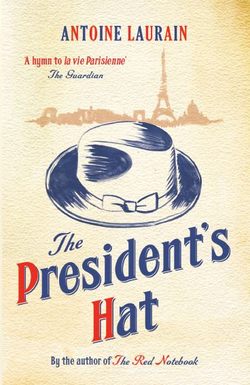Читать книгу The President's Hat - Antoine Laurain - Страница 16
На сайте Литреса книга снята с продажи.
ОглавлениеThat very evening, Fanny Marquant boarded the train at Le Havre heading for Paris Saint-Lazare. She put her suitcase on the rack above seat 88.
Directly opposite her in seat 86 was a young man with long hair, wearing mirrored sunglasses and a Walkman. The badges all over his leather jacket showed rockers with spiky bleached hair, also in black leather. Through his orange foam-covered headphones, Fanny could make out the ‘The Final Countdown’, Europe’s hit single. Fanny personally preferred listening to a new singer on the block, a redhead with anxious eyes by the name of Mylène Farmer whose kooky style and romantic lyrics appealed to her far more than the electric guitar solos of some bleach-blond rockers. You could tell Mylène Farmer was well read; she knew her Edgar Allan Poe and Baudelaire, which Fanny, herself a keen reader and writer, approved of.
Fanny took out a pink Clairefontaine notebook where she had written the first three pages of a story called, simply, ‘Édouard’. The Prix Balbec short story competition was offering a prize of 3,000 francs and publication in the local supplement of Ouest-France. The prize was to be awarded in March at the Grand Hôtel de Cabourg. Fanny had been writing for as long as she could remember, first diaries in little locked notebooks, and later pieces of creative writing she kept to herself until she finally plucked up the courage to send one in to a competition. ‘The Bouquet’ was the winning entry; there was no prize money, but she had never before felt such a sense of recognition and pride. ‘Change of Address’ came third in another local contest and ‘An Afternoon at the Harbour’ was read out at Le Havre Theatre Festival.
The theme of this year’s Prix Balbec was ‘A True Story’ and Fanny was attempting to record for posterity how Édouard had come into her life.
Fanny, a secretary at the tax office in Le Havre, had been having an affair with Édouard Lanier for two years, five months and two weeks now. Édouard Lanier worked in Paris as an executive at Chambourcy, the famous yogurt brand splashed over billboards and TV screens everywhere. Édouard was also married with children.
Early on in their relationship, he had been careless enough to tell Fanny: ‘I love you. I’m going to leave my wife …’ A moment of madness in the first flush of romance when he was still young enough to believe life would turn out just as he wanted. Realising the dizzying implications of his words, he had been saying ever since that he just needed time. It was his eternal refrain: ‘I need time … you need to give me time … all I need is time.’ He went through every possible variation. Over the last two years, Édouard had become more obsessed with time than the most meticulous Swiss watchmaker. He needed time to speak to his wife, time to make her understand and accept him starting over with someone else – and it was turning their sweet love affair sour.
These days, in the hotel room in the Batignolles district of Paris where they met once, sometimes twice, a month, when the fun and games were over, Édouard would tie his tie in the light from the closed shutters, looking wary and waiting for Fanny to ask timidly: ‘Have you spoken to your wife yet?’ His face would fall and he would emit a barely audible sigh. ‘You know how it is, I just need time,’ he would mutter, shaking his head.
And still Fanny went on loving Édouard. She had loved him from the moment he put down his briefcase in the compartment of the Le Havre–Paris train. Tall and slim with salt and pepper hair and a dimple on his chin, he ticked all Fanny’s boxes in the looks department. The wedding ring on his left hand had not escaped her attention, but she was even more struck when it was slipped off shortly afterwards. It left behind an imprint, a little circle running around his third finger which faded over the course of the journey from Normandy to the capital.
All it had taken was a magazine falling to the floor, Édouard bending down to pick it up and handing it back to her with a smile, to seal the start of a passionate affair. If Fanny closed her eyes, she could go back to that one moment which had changed the course of her life. It was like an advert for cologne: man gets on train, pretty woman sits in carriage reading magazine, train starts moving, woman drops magazine, man bends down to pick it up, meaningful looks are exchanged, manly odours mingled with the scent of cologne waft towards her, woman swoons. Life had handed her one of those cheesy moments usually seen only on TV screens and girl-meets-boy American romantic comedies.
Since then, Fanny had come to know the Le Havre–Paris route by heart, along with the occasional detour for a brief encounter in Rouen or Trouville. An average of forty-five trips a year, always paid for by Édouard and always taking place outside the Easter, summer and Christmas holidays which, it goes without saying, he spent far away from her, with his family. At the age of twenty-seven, Fanny had achieved the status of mistress. The question of whether she might one day be promoted to official wife was still up in the air, as was the possibility of promotion to executive secretary at the tax office. Her application for that position was ‘under careful consideration’. The recruitment process for her life role was at the same stage, ‘under careful consideration’ by Édouard, whose inertia was thus on a par with that of the civil service.
